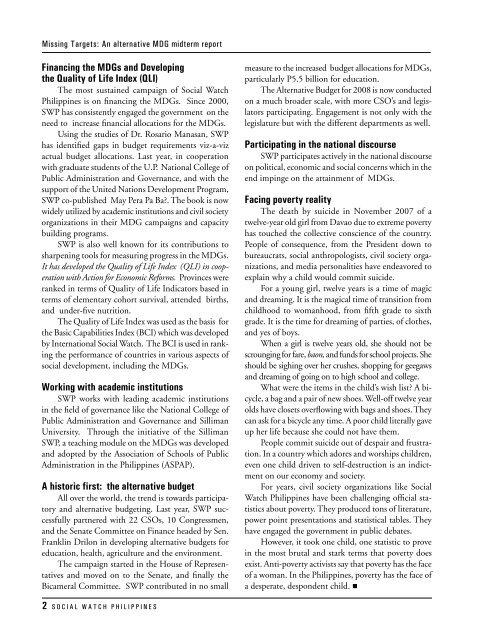one big file - Social Watch
one big file - Social Watch
one big file - Social Watch
Create successful ePaper yourself
Turn your PDF publications into a flip-book with our unique Google optimized e-Paper software.
Missing Targets: An alternative MDG midterm report<br />
Financing the MDGs and Developing<br />
the Quality of Life Index (QLI)<br />
The most sustained campaign of <strong>Social</strong> <strong>Watch</strong><br />
Philippines is on financing the MDGs. Since 2000,<br />
SWP has consistently engaged the government on the<br />
need to increase financial allocations for the MDGs.<br />
Using the studies of Dr. Rosario Manasan, SWP<br />
has identified gaps in budget requirements viz-a-viz<br />
actual budget allocations. Last year, in cooperation<br />
with graduate students of the U.P. National College of<br />
Public Administration and Governance, and with the<br />
support of the United Nations Development Program,<br />
SWP co-published May Pera Pa Ba. The book is now<br />
widely utilized by academic institutions and civil society<br />
organizations in their MDG campaigns and capacity<br />
building programs.<br />
SWP is also well known for its contributions to<br />
sharpening tools for measuring progress in the MDGs.<br />
It has developed the Quality of Life Index (QLI) in cooperation<br />
with Action for Economic Reforms. Provinces were<br />
ranked in terms of Quality of Life Indicators based in<br />
terms of elementary cohort survival, attended births,<br />
and under-five nutrition.<br />
The Quality of Life Index was used as the basis for<br />
the Basic Capabilities Index (BCI) which was developed<br />
by International <strong>Social</strong> <strong>Watch</strong>. The BCI is used in ranking<br />
the performance of countries in various aspects of<br />
social development, including the MDGs.<br />
Working with academic institutions<br />
SWP works with leading academic institutions<br />
in the field of governance like the National College of<br />
Public Administration and Governance and Silliman<br />
University. Through the initiative of the Silliman<br />
SWP, a teaching module on the MDGs was developed<br />
and adopted by the Association of Schools of Public<br />
Administration in the Philippines (ASPAP).<br />
A historic first: the alternative budget<br />
All over the world, the trend is towards participatory<br />
and alternative budgeting. Last year, SWP successfully<br />
partnered with 22 CSOs, 10 Congressmen,<br />
and the Senate Committee on Finance headed by Sen.<br />
Franklin Drilon in developing alternative budgets for<br />
education, health, agriculture and the environment.<br />
The campaign started in the House of Representatives<br />
and moved on to the Senate, and finally the<br />
Bicameral Committee. SWP contributed in no small<br />
measure to the increased budget allocations for MDGs,<br />
particularly P5.5 billion for education.<br />
The Alternative Budget for 2008 is now conducted<br />
on a much broader scale, with more CSO’s and legislators<br />
participating. Engagement is not only with the<br />
legislature but with the different departments as well.<br />
Participating in the national discourse<br />
SWP participates actively in the national discourse<br />
on political, economic and social concerns which in the<br />
end impinge on the attainment of MDGs.<br />
Facing poverty reality<br />
The death by suicide in November 2007 of a<br />
twelve-year old girl from Davao due to extreme poverty<br />
has touched the collective conscience of the country.<br />
People of consequence, from the President down to<br />
bureaucrats, social anthropologists, civil society organizations,<br />
and media personalities have endeavored to<br />
explain why a child would commit suicide.<br />
For a young girl, twelve years is a time of magic<br />
and dreaming. It is the magical time of transition from<br />
childhood to womanhood, from fifth grade to sixth<br />
grade. It is the time for dreaming of parties, of clothes,<br />
and yes of boys.<br />
When a girl is twelve years old, she should not be<br />
scrounging for fare, baon, and funds for school projects. She<br />
should be sighing over her crushes, shopping for geegaws<br />
and dreaming of going on to high school and college.<br />
What were the items in the child’s wish list A bicycle,<br />
a bag and a pair of new shoes. Well-off twelve year<br />
olds have closets overflowing with bags and shoes. They<br />
can ask for a bicycle any time. A poor child literally gave<br />
up her life because she could not have them.<br />
People commit suicide out of despair and frustration.<br />
In a country which adores and worships children,<br />
even <strong>one</strong> child driven to self-destruction is an indictment<br />
on our economy and society.<br />
For years, civil society organizations like <strong>Social</strong><br />
<strong>Watch</strong> Philippines have been challenging official statistics<br />
about poverty. They produced tons of literature,<br />
power point presentations and statistical tables. They<br />
have engaged the government in public debates.<br />
However, it took <strong>one</strong> child, <strong>one</strong> statistic to prove<br />
in the most brutal and stark terms that poverty does<br />
exist. Anti-poverty activists say that poverty has the face<br />
of a woman. In the Philippines, poverty has the face of<br />
a desperate, despondent child. •<br />
S O C I A L W A T C H P H I L I P P I N E S

















